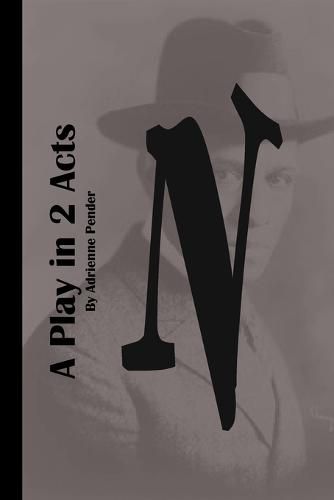Readings Newsletter
Become a Readings Member to make your shopping experience even easier.
Sign in or sign up for free!
You’re not far away from qualifying for FREE standard shipping within Australia
You’ve qualified for FREE standard shipping within Australia
The cart is loading…






This title is printed to order. This book may have been self-published. If so, we cannot guarantee the quality of the content. In the main most books will have gone through the editing process however some may not. We therefore suggest that you be aware of this before ordering this book. If in doubt check either the author or publisher’s details as we are unable to accept any returns unless they are faulty. Please contact us if you have any questions.
Adrienne Earle Pender’s N dramatizes the struggle between playwright Eugene O'Neill and actor Charles Sidney Gilpin over the inclusion of the N word in the script for O'Neill’s first box office hit, The Emperor Jones. in 1920. The play was turned into a film The Black Emperor of Broadway to be screened in 2020. O'Neill and Gilpin fight from rehearsal to Broadway run and, eventually, to the London tour. To Eugene O'Neill, a word is just a word. For Charles Gilpin, those six letters have the power to unravel everything that he has ever worked for. At stake for O'Neill? His artistic vision. For Gilpin? His entire career and family. Eugene O'Neill’s groundbreaking 1921 play, The Emperor Jones, was the first American play that featured an African-American actor in the lead role on Broadway. Charles S. Gilpin’s portrayal of Emperor Brutus Jones was hailed as revelatory, and he was named the finest actor of the age. The opening of The Emperor Jones made stars of both men; it was O'Neill’s first commercial success, and Charles Gilpin became the toast of the theater world, becoming the first black man to be honored by the Drama League of New York, But by 1926, O'Neill was a legend and Gilpin was lost to history. The script of N explores the challenging relationship between Gilpin and O'Neill and how it ultimately hinged on one word; a word that lifted one of them to the heights of American theater, and a word that destroyed the other.
$9.00 standard shipping within Australia
FREE standard shipping within Australia for orders over $100.00
Express & International shipping calculated at checkout
This title is printed to order. This book may have been self-published. If so, we cannot guarantee the quality of the content. In the main most books will have gone through the editing process however some may not. We therefore suggest that you be aware of this before ordering this book. If in doubt check either the author or publisher’s details as we are unable to accept any returns unless they are faulty. Please contact us if you have any questions.
Adrienne Earle Pender’s N dramatizes the struggle between playwright Eugene O'Neill and actor Charles Sidney Gilpin over the inclusion of the N word in the script for O'Neill’s first box office hit, The Emperor Jones. in 1920. The play was turned into a film The Black Emperor of Broadway to be screened in 2020. O'Neill and Gilpin fight from rehearsal to Broadway run and, eventually, to the London tour. To Eugene O'Neill, a word is just a word. For Charles Gilpin, those six letters have the power to unravel everything that he has ever worked for. At stake for O'Neill? His artistic vision. For Gilpin? His entire career and family. Eugene O'Neill’s groundbreaking 1921 play, The Emperor Jones, was the first American play that featured an African-American actor in the lead role on Broadway. Charles S. Gilpin’s portrayal of Emperor Brutus Jones was hailed as revelatory, and he was named the finest actor of the age. The opening of The Emperor Jones made stars of both men; it was O'Neill’s first commercial success, and Charles Gilpin became the toast of the theater world, becoming the first black man to be honored by the Drama League of New York, But by 1926, O'Neill was a legend and Gilpin was lost to history. The script of N explores the challenging relationship between Gilpin and O'Neill and how it ultimately hinged on one word; a word that lifted one of them to the heights of American theater, and a word that destroyed the other.